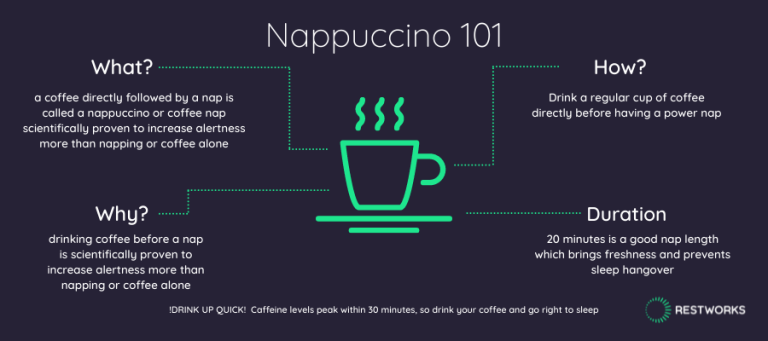
What is a nappuccino?
Nappuccino is another word for a coffee nap. A nappuccino takes advantage of the synergy effect that arises when caffeine and a power nap are combined.
Nappuccino 101
- Drink a cup of coffee quickly. If you drink it too long before your nap, caffeine will kick in too early and prevent you from falling asleep.
- Power nap for approximately 20 minutes. Read more about the optimal nap times below.
- Make sure to wake up on time. Napping for longer than 30 minutes will cause sluggishness rather than increase alertness.
Once your ‘nappuccino’ is finished, you should feel fresh and ready for any task at hand!

How does it work?
There have been several small studies verifying the effects of coffee naps (you can find one here). These confirm that the benefit from combining caffeine and power naps is greater than just power napping or drinking coffee alone.
It is thought that caffeine and napping form a synergy that has a great deal to do with the organic compound adenosine. Caffeine works by blocking adenosine, and since adenosine levels are at their lowest right after a nap, this might account for the extra increase in alertness.
Optimal nap time
The recommended nap length for a nappuccino is 20 minutes. Studies have shown this to be the best length of time for a power nap, as one does not enter deep sleep, yet will still feel rested.
With power naps, overall, shorter is better. In one study, as little as six minutes of sleep (actual sleep, be mindful) was shown to be sufficient to improve memory.
Naps longer than 30-minutes, on the other hand, are not desirable. This is because they will cause you to enter deep sleep, which will lead to a sleep hang-over unless a full sleep cycle (typically 90 minutes) is completed. Long naps can also make it harder for you to fall asleep at night.

Nappuccino benefits
The benefits of a nappuccino or coffee nap are the same as those of regular napping PLUS the increased alertness from caffeine.
Short naps, in general, have a profound effect on productivity, creativity, as well as overall health, including decreased levels of stress and a lower risk of coronary heart disease.
To learn more about the scientifically verified benefits of napping, visit our benefits page.
